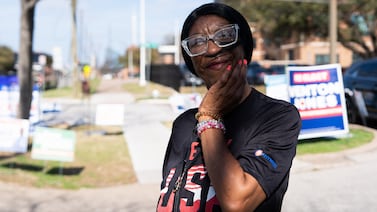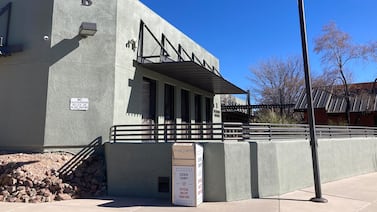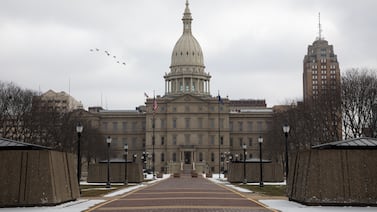Votebeat is a nonprofit news organization reporting on voting access and election administration across the U.S. Sign up for Votebeat Wisconsin’s free newsletter here.
Months after the Wisconsin Supreme Court legalized them, ballot drop boxes remain a source of deep division among public officials in communities across the battleground state.
While city officials in Madison and Milwaukee embraced them early for the August primary, several communities in Waukesha and Milwaukee counties have opted out of using drop boxes for November’s election, to some voters’ dismay. Some clerks in Dodge County decided not to use drop boxes after the county sheriff warned against them, saying he struggled with “the appearance of the potential for fraud even if no fraud occurs.”
Then, this past week, the issue boiled over in Wausau, after Mayor Doug Diny unilaterally decided to remove the city’s drop box, reportedly ignoring warnings from the city attorney. The city clerk has referred the matter to law enforcement.
The disputes point to lingering distrust of drop boxes as a ballot return option, after the liberal-controlled Wisconsin Supreme Court legalized them this year. The court’s decision overturned a ban issued by the court in 2022 when it had a conservative majority. But it left some unresolved questions over who at the local level can make the decision to authorize — or ban — drop box use.
Now, across the state, some local officials are fighting to ban drop boxes in their communities in the name of guarding against fraud, while others are lobbying to keep them as a way to make voting more convenient.
With a few weeks left before the election, at least 70 Wisconsin municipalities are using drop boxes, said Sam Liebert, Wisconsin director of the group All Voting Is Local. Meanwhile, at least 63 municipalities have banned or explicitly opted out of them.
One of them is Brookfield, the western suburb of Milwaukee. Residents there requested access to drop boxes, saying it would eliminate a barrier for voters with disabilities and older adults who can’t always go to the city hall to drop off their absentee ballot, TMJ4 reported. But officials voted to opt out after the city clerk and city attorney said drop boxes would require extra work to set up and monitor and that they were unnecessary in a post-pandemic election.
In many conservative areas, the opposition that led officials to forgo or ban drop boxes came as a result of unsubstantiated claims that they could be used to perpetrate large-scale ballot fraud.
Liebert said the bans would make it harder to vote. “I understand maybe it’s politically expedient or politically savvy to buy into the big lie and the mis- and disinformation that’s around drop boxes,” he said, “but also, at the same time, you’re going to have more voter participation if you have this option.”
In the 2020 election, liberal communities were likelier than conservative communities to have drop boxes as a ballot return option, according to a study by the conservative group Wisconsin Institute for Law & Liberty. On average, the study found, municipalities with drop boxes had 48 more voters participating than municipalities without them.
Drop box use gets pushback from city officials
When the high court legalized drop boxes in July, the majority said clerks had discretion under the law to use them. But across the state, mayors and municipal boards have asserted their power to restrict access to drop boxes, sometimes without clerks’ approval.
In Wausau, for example, Diny, the newly elected mayor, moved the city’s drop box on Sept. 22 from outside City Hall to inside his office, telling City Council President Lisa Rasmussen that it would remain there “until certain issues that the clerk is aware of are addressed.”
Rasmussen objected. “It is inappropriate for you to attempt to influence the clerk’s decision about the box and equally wrong for you to take it from its posted site following her decision,” she told Diny in an email obtained by Votebeat. “The action you took may have serious legal ramifications. I would imagine that if a citizen did the same thing, they’d already be answering to the police.”
Diny, who was backed by Republicans in the nonpartisan mayoral race, later said he moved the drop box because he feared somebody would steal it, since it hadn’t at that point been secured to the ground, WSAU reported.
On Sept. 25, City Clerk Kaitlyn Bernarde said she was referring the matter to the local district attorney, citing a law requiring clerks to submit reports of suspected election fraud and irregularities. In response, Diny said that Bernarde was “out of her lane,” and that the City Council should have the final say on drop boxes.
Days later, after Democratic Gov. Tony Evers and voting rights groups condemned Diny’s actions, the drop box was back — this time, secured to the ground — and the Portage County Sheriff’s Department was investigating the incident, the Wausau Pilot & Review reported.
On Wednesday, four Wausau residents asked a federal prosecutor for an investigation, alleging in a letter that Diny “may have broken federal law by using his official position to interfere with citizens’ right to vote.”
One of those residents, Jay Coldwell, told Votebeat that “it was just shocking to see that our elected mayor would interfere with the election process.”
“If it’s that today, what is it tomorrow, and how many other cities will this happen in?” he said.
Bernarde and Diny didn’t respond to requests for comment.
One reason for such power struggles is that clerks’ roles can vary across the state, with different ordinances in different municipalities, said Rick Esenberg, founder of the Wisconsin Institute for Law & Liberty, a conservative law firm that filed the lawsuit leading to the first drop box ban.
“In general, I’d think a municipal board, as the legislative body, could ban drop boxes or specify the conditions under which they are used,” he said. “It seems anomalous to think that a clerk would have unrestrainable authority and I don’t read [the Wisconsin Supreme Court opinion that legalized drop boxes] to say that they do.”
“A harder question,” Esenberg added, “is whether a clerk can unilaterally decide to use drop boxes. There is an argument for that, although perhaps not.”
Clerks have a lot of authority to run elections, but they, like most civic actors, have checks and balances, said Scott Thompson, staff counsel for Law Forward, a group seeking more inclusive voting policies.
But after the state Supreme Court’s ruling this year, the boundaries of power between mayors, municipal boards, and clerks is a “pretty complicated legal question,” Thompson said.
“Big picture, I think municipalities are clearly working through this, as local governments always work through various issues,” he said.
Baseless claims from 2020 echo into 2024
Opponents of drop boxes, including Diny, argue that there are plenty of other ways to return a ballot.
Many of them have also relied on the talking point that drop boxes enable the harvesting of fake ballots — like filling out and returning multiple ballots under fake names. Those claims were popularized by the film “2,000 Mules,” a film about purported drop box misuse in the 2020 election that has been roundly debunked.
Such claims have led to litigation and laws targeting banning drop boxes across the country. And they’ve been repeated in Wisconsin by Republicans including U.S. Senate candidate Eric Hovde, who called for 24/7 drop box monitoring in Madison to ensure nobody is “jamming fake ballots.”
But those claims about the dangers of drop boxes are baseless. Election officials have safeguards in place to protect against the possibility of widespread fraud through drop boxes.
Wisconsin clerks process absentee ballots from drop boxes just as they do any other absentee vote, including those sent through the mail or dropped off in person. With narrow exceptions for military voters, election officials send absentee ballots only to Wisconsin residents who have requested one and are confirmed to have registered to vote with a valid ID.
Before opening the ballot envelopes deposited in a drop box, election officials verify that they have witness and voter signatures and a witness address. Then they open the envelope, verify that the person casting the ballot was qualified to vote and that they hadn’t already voted in the election, and record them on the poll books as having returned their absentee ballot. Only then would they tabulate the vote.
Proponents say the benefits of drop boxes are clear.
In rural Wisconsin, Thompson from Law Forward said, they can be especially helpful to residents who aren’t frequently in town. And they provide an extra option for people worried about mail delays, Liebert noted.
They’re also helpful to voters with disabilities, who are likelier than other people to vote absentee and who Thompson said are “always caught in the middle” of anti-democratic attempts to restrict ballot access.
“You put drop boxes in the community, it makes it that much more likely that you can exercise the franchise,” Thompson said.
Access to drop boxes varies across municipalities that use them
Among municipalities using drop boxes, their visibility and availability vary, which can create confusion for voters.
In Madison, voters have access to 14 drop box sites, open day and night until the Monday before the election. That’s about one drop box for every 20,000 people. Milwaukee also has over a dozen drop boxes. In Eau Claire, with about 70,000 people, there’s just one drop box, also open 24 hours a day.
There’s also a single drop box in Marshfield, a city of about 20,000 people in central Wisconsin, but it’s only available after the City Hall closes.
That policy ensures that night-shift workers who live in the city can return their ballot after hours, and that people returning their ballots during the day can have a clerk or staff member double-check that their ballot envelope is correctly filled out, Marshfield City Clerk Jessica Schiferl said.
Schiferl said she came up with that policy after the city attorney and administrator said the Wisconsin Supreme Court ruling gave clerks the final say over drop box use. She then alerted the mayor about the drop box plans.
Officials in Madison and Milwaukee have heavily promoted their drop boxes, but other municipalities don’t promote their use anywhere, Liebert said, “because they don’t want to stir up the bees nest of election deniers or bad faith actors who would be upset if they knew that their clerk or city hall was actively promoting a drop box.”
Alexander Shur is a reporter for Votebeat based in Wisconsin. Contact Alexander at ashur@votebeat.org.




